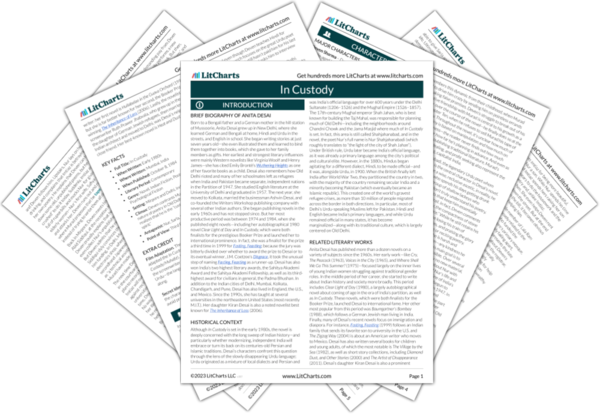Abid Siddiqui Quotes in In Custody
Fatefully, it was the head of the Urdu department, Abid Siddiqui who, in keeping with the size and stature of that department, was a small man, whose youthful face was prematurely topped with a plume of white hair as if to signify the doomed nature of his discipline. It was perhaps unusual to find a private college as small as Lala Ram Lal’s offering a language such as Urdu that was nearly extinct, but it happened that Lala Ram Lal’s descendants […] had to accept a very large donation from the descendants of the very nawab who had fled Delhi in the aftermath of the 1857 mutiny and built the mosque. […] It was promised a department in which its language would be kept alive in place of the family name.
Seeing that line waver and break up and come together again upon the sheet of blue paper, Deven felt as if he were seeing all the straight lines and cramped alphabet of his small, tight life wavering and dissolving and making way for a wave of freshness, motion, even kinesis. In openness lay possibilities, the top of the wave of experience surging forward from a very great distance, but lifting and closing in and sounding loudly in his ear. What had happened to the hitherto entirely static and stagnant backwaters of his existence? It was not the small scrawled note, not Siddiqui or Rai or anyone to do with the college who had caused this stir; it was Nur, Nur’s poetry and Nur’s person.
What had made Siddiqui do it?
Nur, of course, the magic name of Nur Shahjahanabadi of course, thought Deven, walking out into the brassy light. It was a name that opened doors, changed expressions, caused dust and cobwebs to disappear, visions to appear, bathed in radiance. It had led him on to avenues that would take him to another land, another element.
Later Deven could not understand how it all come about—how he, the central character in the whole affair, the protagonist of it (if Murad were to be disregarded), the one on whom depended the entire matter of the interview, the recording and the memoirs, to which Siddiqui was no more than an accessory, having arrived on the scene accidentally and at a later stage, and in which he played a minor role—how he, in the course of that evening, had relinquished his own authority and surrendered it to Siddiqui who now emerged the stronger while he, Deven, had been brought to his knees, abject and babbling in his helplessness. How?

Abid Siddiqui Quotes in In Custody
Fatefully, it was the head of the Urdu department, Abid Siddiqui who, in keeping with the size and stature of that department, was a small man, whose youthful face was prematurely topped with a plume of white hair as if to signify the doomed nature of his discipline. It was perhaps unusual to find a private college as small as Lala Ram Lal’s offering a language such as Urdu that was nearly extinct, but it happened that Lala Ram Lal’s descendants […] had to accept a very large donation from the descendants of the very nawab who had fled Delhi in the aftermath of the 1857 mutiny and built the mosque. […] It was promised a department in which its language would be kept alive in place of the family name.
Seeing that line waver and break up and come together again upon the sheet of blue paper, Deven felt as if he were seeing all the straight lines and cramped alphabet of his small, tight life wavering and dissolving and making way for a wave of freshness, motion, even kinesis. In openness lay possibilities, the top of the wave of experience surging forward from a very great distance, but lifting and closing in and sounding loudly in his ear. What had happened to the hitherto entirely static and stagnant backwaters of his existence? It was not the small scrawled note, not Siddiqui or Rai or anyone to do with the college who had caused this stir; it was Nur, Nur’s poetry and Nur’s person.
What had made Siddiqui do it?
Nur, of course, the magic name of Nur Shahjahanabadi of course, thought Deven, walking out into the brassy light. It was a name that opened doors, changed expressions, caused dust and cobwebs to disappear, visions to appear, bathed in radiance. It had led him on to avenues that would take him to another land, another element.
Later Deven could not understand how it all come about—how he, the central character in the whole affair, the protagonist of it (if Murad were to be disregarded), the one on whom depended the entire matter of the interview, the recording and the memoirs, to which Siddiqui was no more than an accessory, having arrived on the scene accidentally and at a later stage, and in which he played a minor role—how he, in the course of that evening, had relinquished his own authority and surrendered it to Siddiqui who now emerged the stronger while he, Deven, had been brought to his knees, abject and babbling in his helplessness. How?











